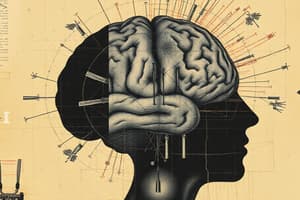Podcast
Questions and Answers
What does consciousness primarily refer to?
What does consciousness primarily refer to?
Which stage of sleep is characterized by rapid eye movement (REM)?
Which stage of sleep is characterized by rapid eye movement (REM)?
What is hypnotic suggestibility mainly associated with?
What is hypnotic suggestibility mainly associated with?
Which EEG band is associated with deep sleep?
Which EEG band is associated with deep sleep?
Signup and view all the answers
What does circadian rhythm refer to?
What does circadian rhythm refer to?
Signup and view all the answers
Which of the following is NOT a characteristic of Stage 2 sleep?
Which of the following is NOT a characteristic of Stage 2 sleep?
Signup and view all the answers
What phenomenon occurs during the transition state from wakefulness to sleep?
What phenomenon occurs during the transition state from wakefulness to sleep?
Signup and view all the answers
What was Freud's belief regarding dreams?
What was Freud's belief regarding dreams?
Signup and view all the answers
Study Notes
Consciousness
- The awareness of internal and external stimuli
Hypnosis
- A trance-like state involving heightened attention, concentration, and suggestibility
- It resembles sleep, but individuals remain awake.
Mesmerism (animal magnetism)
- A purported force influencing human beings (mesmerisation)
- Coined and explored by Franz Mesmer
Electroencephalograph (EEG)
- Measures brain electrical activity using electrodes placed on the scalp
- Results show brainwave electrical activity over time
EEG Bands
- Human brainwave activity is categorized into four frequency-based bands:
- Beta (13-24 cps): Normal waking thought, alert problem-solving
- Alpha (8-12 cps): Deep relaxation, blank mind, meditation
- Theta (4-7 cps): Light sleep, relaxation, blank mind, meditation
- Delta (less than 4 cps): Deep sleep
Sleep
- Biological rhythms: Periodic fluctuations in physiological functions
- Circadian rhythms: The 24-hour biological cycles found in humans and other species
- These cycles influence physical, mental, and behavioral changes within the 24-hour period.
Five Stages of Sleep
-
Stage 1:
- The beginning of the sleep cycle
- Light sleep (theta waves)
- Easy to wake
-
Stage 2:
- Lasts approximately 20 minutes
- Characterized by sleep spindles (bursts of rapid brain activity)
- Body temperature and heart rate decrease
-
Stage 3:
- Deep and slow brain waves (delta waves)
- Transition from light to deep sleep
-
Stage 4:
- Slow brain waves (delta waves)
- Lasts about 30 minutes
- May be associated with bed-wetting and sleepwalking
-
Stage 5 (REM Sleep):
- Rapid Eye Movement sleep
- Increased respiration and brain activity
- Sometimes called "paradoxical sleep"
- Lasts approximately 90 minutes, but varies throughout the night
Hypnogogic and Hypnopompic Hallucinations
- Hypnogogic Hallucinations: Brief hallucinations that occur during the transition from wakefulness to sleep (hypnogogia)
- Hypnopompic Hallucinations: Hallucinations that occur during the transition from sleep to waking (hypnopomp)
Dream Analysis
- Freud believed dreams offer insights into the unconscious mind
Studying That Suits You
Use AI to generate personalized quizzes and flashcards to suit your learning preferences.
Related Documents
Description
Explore the intricate concepts of consciousness, hypnosis, and sleep in this comprehensive quiz. Delve into the various brainwave activities as measured by EEG, and understand the significance of different states of awareness. Challenge your knowledge on the interplay between biological rhythms and psychological phenomena.




